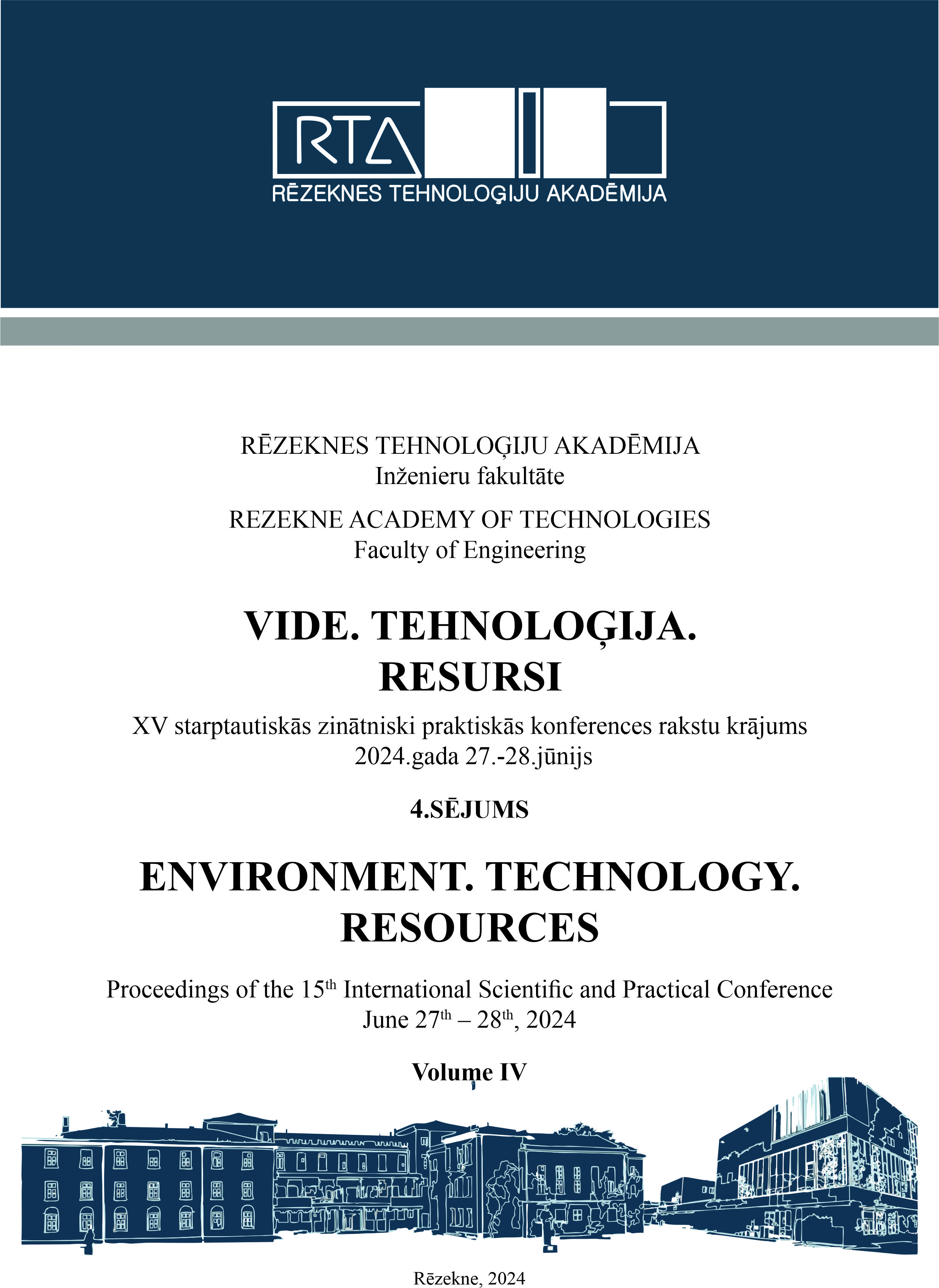BUILDING RESILIENCE OF UKRAINIAN UNIVERSITIES IN THE FACE OF MILITARY INTERVENTION: EXPLORING FORMS AND IMPLICATION
DOI:
https://doi.org/10.17770/etr2024vol4.8243Keywords:
university resilience, crisis situation, war, intervention, public administrationAbstract
This article explores the concept of organizational resilience in higher education institutions, which can enable them to deal with unexpected events, recover from crises, and contribute to future success. Despite the growing academic interest in resilience, there is a lack of consensus on its definition and how it works, highlighting the need for additional knowledge on the capabilities and conditions that make up sustainability. The authors contribute to this field by conceptualizing resilience as a meta capacity and breaking it down into three stages: adaptation, transformation, and anticipation. They also identify core capabilities, including strategic vision, operational flexibility, and a supportive culture, that form organizational resilience. Drawing on process research, the authors provide an overview of the relationship and interaction between the different stages of resilience, as well as the main prerequisites and driving forces. They also propose four tools based on an analysis of European normative-legal acts that can restore stability in crisis situations. This study advances understanding of the complex and built-in construct of organizational resilience and offers insights that can inform future empirical work in this area. The article underscores the significance of cultivating resilience capabilities in higher education institutions, particularly during times of turbulence and ambiguity, to guarantee their enduring.References
G.Abuseridze, International trade in the context of the COVID-19 pandemic. In: Bari, M., Alaverdov, E. (eds.) Impact of Infodemic on Organizational Performance, pp. 217–230. IGI Global (2021). (in English). https://doi.org/10.4018/978-1-7998-7164-4.ch013 Accessed 10.03.2024.
D.Teperik, I. Miroshkin, O.Iliuk, A. Apetyk, L. Snihur, G.Senkiv, D.Dubov, and O. Pokalchuk, (2021). Resilient Ukraine - a delicate nosaic? Society, Media, Security, and Future Prospects. Research report. Tallinn, Estonia: International Centre for Defence and Security, ISBN 978-9916-9699-3-9 (pdf), https://icds.ee/en/resilient-ukraine-a-delicate-mosaic-society-media-security-and-future-prospects Accessed 10.03.2024.
A.Kurapov, V. Pavlenko, A. Drozdov, V. Bezliudna, A. Reznik, and R. Isralowitz, (2022). Toward an understanding of the Russian-Ukrainian war impact on university students and personnel. Journal of Loss and Trauma, 1–8.
G.Abuseridze, O. Agapova, I. Paliani-Dittrich, J. Grasis, and E. Kavelidze, (2023). Migration From Georgia and Ukraine in the Context ofRussian Aggression. In E. Alaverdov & M. Bari (Eds.), Handbook of Research on the Regulation of the Modern Global Migration and EconomicCrisis (pp. 107-121). IGI Global. URL: https://doi.org/10.4018/978-1-6684-6334-5.ch007 Accessed 10.03.2024.
A Strategic Compass for Security and Defence - For a European Union that protects its citizens, values and interests and contributes to international peace and security (2022). Approved by General Secretariat of the Council 7371/22 URL: https://data.consilium.europa.eu/doc/document/ST-7371-2022-INIT/en/pdf 19.05.2023.
NATO Strategic Compass (2022). Adopted by the Heads of State and Government of the NATO Allies. URL: https://www.nato.int/nato_static_fl2014/assets/pdf/2022/6/pdf/290622-strategic-concept.pdf Accessed 10.03.2024.
Transforming our world: the 2030 Agenda for Sustainable Development. Resolution adopted by the General Assembly on 25 September 2015. Retrieved from: https://www.un.org/ga/search/view_doc.asp?symbol=A/RES/70/1&Lang=E Accessed 10.03.2024.
European Research Area Policy Agenda (2021). Luxembourg: Publications Office of the European Union. Retrieved from: https://research-and-innovation.ec.europa.eu/strategy/strategy-2020-2024/our-digital-future/european-research-area_en Accessed 10.03.2024.
Europe's strategy for international cooperation in a changing world (2021). European Commision, Brussels, COM(2021) 252 final/2. Retrieved from: https://eur-lex.europa.eu/legal-content/EN/TXT/PDF/?uri=COM:2021:252:REV1&rid=2 Accessed 10.03.2024.
Regulation (EU) 2021/241 of the European Parliament and of the Council of 12 February 2021 establishing the Recovery and Resilience Facility (2021). Official Journal of the European Union. Retrieved from: https://eur-lex.europa.eu/legal-content/EN/TXT/?uri=CELEX%3A32021R0241&qid=1667997764795 Accessed 10.03.2024.
Council Resolution on a strategic framework for European cooperation in education and training towards the European Education Area and beyond (2021-2030) 2021/C 66/01 (2021). Official Journal of the European Union. Retrieved from: https://eur-lex.europa.eu/legal-content/EN/ALL/?uri=CELEX:32021G0226(01) Accessed 10.03.2024.
The Sustainable Development Goals (2023). Official UNDP Web-page. Retrieved from: https://www.undp.org/sustainable-development-goals Accessed 10.03.2024.
On approval of the Strategy for the Development of Higher Education in Ukraine for 2022-2032 (2022). Order of the Cabinet of Ministers of Ukraine, Strategy 23.02.2022 No. 286-р. Retrieved from: https://zakon.rada.gov.ua/laws/show/286-2022-%D1%80#Text Accessed 10.03.2024.
Outcome Document of the Ukraine Recovery Conference URC2022 “Lugano Declaration” (2022). Retrieved from: https://uploads-ssl.webflow.com/621f88db25fbf24758792dd8/62c68e41bd53305e8d214994_URC2022%20Lugano%20Declaration.pdf Accessed 10.03.2024.
Multi-agency Donor Coordination Platform ramps up efforts to help Ukraine address priority recovery needs in 2023 (2023). Official European Commission Web-page. Retrieved from: https://ec.europa.eu/commission/presscorner/api/files/document/print/en/ip_23_2102/IP_23_2102_EN.pdf Accessed 10.03.2024.
Ukraine Rapid Damage and Needs Assessment: February 2022 - February 2023 (English). (2023) Washington, D.C. : World Bank Group. Retrieved from: http://documents.worldbank.org/curated/en/099184503212328877/P1801740d1177f03c0ab180057556615497 Accessed 19.05.2023.
National Recovery Plan of Ukraine (2022). Adopted on the Ukraine Recovery Conference in Lugano. Retrieved from: https://uploads-ssl.webflow.com/621f88db25fbf24758792dd8/62c166751fcf41105380a733_NRC%20Ukraine%27s%20Recovery%20Plan%20blueprint_ENG.pdf Accessed 10.03.2024.
Guidelines on fast-track recognition of Ukrainian academic qualifications (2022). Retrieved from: https://education.ec.europa.eu/sites/default/files/2022-06/guidelines-fast-track-recognition-ukrainian-academic-qualifications.pdf Accessed 10.03.2024.
Ukraine: Commission presents guidance to help people fleeing war access jobs, training and adult learning (2022). European Commission - Press release. Retrieved from: https://ec.europa.eu/commission/presscorner/api/files/document/print/en/ip_22_3620/IP_22_3620_EN.pdf Accessed 10.03.2024.
Supporting refugee learners from Ukraine in higher education in Europe (2022). European Commission, European Education and Culture Executive Agency, Publications Office of the European Union. Retrieved from: https://op.europa.eu/en/publication-detail/-/publication/3a49a873-0bc2-11ed-b11c-01aa75ed71a1/language-en/format-PDF/source-262591754# Accessed 10.03.2024.
Lifelong guidance policy for Ukrainian refugees in the EU (2023). European Centre of the Development of Vocational Training. Retrieved from: https://www.cedefop.europa.eu/files/8144_en.pdf Accessed 10.03.2024.
ERA4Ukraine (2023). An official website of the European Union. Retrieved from: https://euraxess.ec.europa.eu/ukraine Accessed 10.03.2024.
MSCA4Ukraine (2023). An official website of the SAR Europe. Retrieved from: https://sareurope.eu/msca4ukraine/?utm_source=flexmail&utm_medium=e-mail&utm_campaign=euanewsletter920221269euanewsletteroctober20221021t072200316z&utm_content=msca4ukraine+fellowship Accessed 10.03.2024.
The UK-Ukraine Twinning Initiative (2023). An official website of the Twinning Ukraine. https://www.twinningukraine.com/ Accessed 10.03.2024.
Downloads
Published
Issue
Section
License
Copyright (c) 2024 Olena Agapova, Giga Abuseridze, Andrii Svintsytskyi , Janis Grasis

This work is licensed under a Creative Commons Attribution 4.0 International License.



